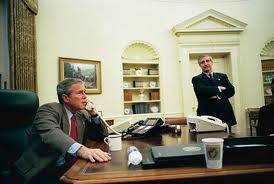C-SPAN Video Conference # 2: Andrew Card
Posted by mcarvaja in Comm361, Online Journalism, Student Blog Posts, Uncategorized, tags: Comm361, Student Blog Posts
One of a presidential chief of staff’s greatest challenges is deciding what is important for the president to know.
“Presidents, like everybody else, want to know everything,” said Andrew Card, former White House chief of staff for George W. Bush from 2000-2006. “It’s the chief of staff’s job to make sure that the president has what he needs — but not everything he wants — and that he focuses on real presidential decisions, rather than just government decisions.”
Card, who joined Steve Scully, the political editor for the C-SPAN networks, and participating students from George Mason University, Purdue University and the University of Denver for a live video conference on Apr. 7, provided a window into a chief of staff’s daily life.
“I would try to be at my desk at 5:30 in the morning,” Card said. “The first document that I would read would be the President’s Daily Brief, the PDB. That would be information and analysis that came from the CIA. Then I would read economic and domestic news.”
Card also kept constant tabs on the whereabouts of the first and second families using a little locator box on his desk. Days were not limited to eight-hour shifts.
“You don’t do real work while the sun is shining,” said Card. “You do the work in the middle of the night. It wasn’t unusual for me to get a call from the speaker to come to the House at two, three or four o’clock in the morning.”
The president’s job is an even more demanding one.
“The president had to face unprecedented challenges,” Card said. “I watched President George W. Bush lead with presidential courage. He had the courage to make very, very tough decisions.”
Card shared some insights into the Bush administration:
- At first, everyone thought a plane flying into one of the World Trade Center towers was “a horrible accident.”
- The realization that America was under attack by terrorists caused Bush to focus “on the unique and unbelievably lonely responsibility he had to preserve, protect and defend.”
- The “Mission Accomplished” banner on the aircraft carrier USS Abraham Lincoln celebrated the successful completion of a mission by the carrier, its leadership and its crew. The banner “was never meant to be part of the overall messaging of the president’s speech. If you read the president’s speech, he never said that he accomplished the mission of the battles in Iraq.”
- Bush did not have a victory celebration after either of his elections.
- In his second term, Bush wanted to reform Social Security and immigration.
In an apparent swipe at Obama, Card said Bush did not allow politics to drive his decision-making.
“Presidents have to be love magnets when they seek office, but they have to have the courage to be lonely while they serve,” said Card. “Some presidents don’t know how to do both of those inconsistent things at the same time.”
Card hammered the point home further.
“Being smart includes recognizing the world as it is, rather than what you want it to be,” Card said. “It’s very difficult to deal with the world as it is.”
To illustrate, Card enumerated various crises, other than 9/11, during the Bush administration:
- A U.S. submarine hit a Japanese trawler off the coast of Hawaii, causing an international incident.
- A Chinese plane forced an American plane down, causing tensions with China.
- Sen. Jim Jeffords switched political parties, causing the Republicans to lose control of the Senate and making it harder to get support for tax cuts.
- Karzai, the first democratically elected leader in Afghanistan, did not turn out to be the leader everyone hoped he would be. Corruption is still a big problem there.
Professor Steve Klein asked, “How much don’t we know and never learn of ?”
Card confessed that what he misses the most is the information he was privy to, even though it was “frightening, the enemy is real and challenging to thwart.”
Produced by C-SPAN, the distance learning course is a unique opportunity for students to interview guests via video conference. It airs on Friday at 5 p.m. and also streams online (http://www.c-span.org/Distance_Learning/).

 Entries (RSS)
Entries (RSS)
Leave a Reply